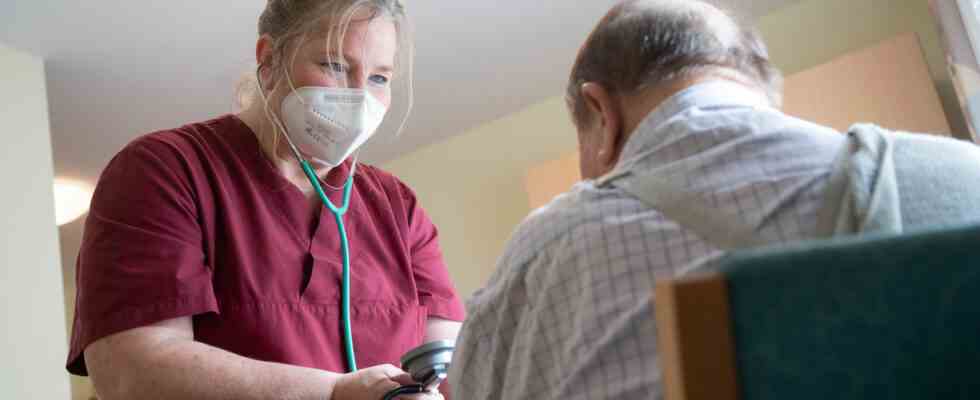Status: 09/17/2022 10:40 a.m
Inflation and rising personnel costs mean that care in homes is becoming increasingly difficult to afford for more and more people. How do those affected deal with it? An example from Saarland.
“I pay around 3300 euros a month with all the trimmings.” Gerhard Kiss puts on his reading glasses, digs out last month’s carefully folded bill from his pocket and reads out:
Care-related expenses: around 1400 euros. In addition, there is the training refinancing of 80 euros, then the training supplement of 138 euros. Then comes the accommodation: 652 euros for a single room. The catering stationary are 374 euros. Last but not least, there are also investment costs, which are 652 euros. That makes a total of 3300 euros.
The sporty 94-year-old does not have a nursing degree. That’s why he doesn’t get a surcharge from the nursing care fund, he pays everything himself. In his case, that’s even more than the average personal contribution of around 2,700 euros in Saarland nursing homes, one of the highest contributions nationwide. There it could soon be an average of 700 euros more per month, the Saarland nursing society calculates. In all other regions of Germany, too, the personal contribution for care in homes will increase drastically. Depending on the federal state, experts expect an increase of several hundred euros.
Only a few are doing well financially
Alone, in his own apartment, Gerhard Kiss could certainly live cheaper. But he fell a few times, his daughter doesn’t live close by. Here at the Bruder-Konrad-Haus senior center in St. Ingbert, he feels safe and in good hands. Unlike many other seniors, he doesn’t have to cut corners, even if the costs go up.
“I still have leeway and a few piggy banks at home,” he says. “But many others had to sell their house, for example.” At the time he was working as a chemist for a Swiss company and he was doing well financially. But there he is the exception.
Once a week Kiß goes to St. Ingbert in the city and buys one or two things there that aren’t available here in the old people’s home. “I’m also generous when it comes to distribution.” So that the others feel a little better too.
A third of those in need of care in Germany cannot bear the monthly costs for the home on their own, so they receive help for care, i.e. social assistance. This is the result of figures from the Federal Statistical Office. In some federal states, this proportion is significantly higher. In Saarland, this affects around half of the people in nursing homes.
Help only “if it is absolutely necessary”
It’s the same with Emmy Riess. She lives in the same house as Gerhard Kiss, one floor up. A few years ago she moved to a nursing home with her husband – their front door is still decorated with pictures they took together. The widow now lives alone in her room, which she laughingly calls a “suite”. A floral bedspread turns the bed into a sofa during the day, perfumes and old photos are neatly lined up on the dresser.
She wears a patterned blouse, a red necklace and large earrings. Being well-groomed is important to her, even if it becomes more difficult because she can no longer see so well. “If it absolutely has to be,” she asks the nurses for help. She feels in good hands here – but life here has its price.
My entire pension is going away, then I have pocket money of 139 euros a month, plus the hairdresser, pedicure and everything else. I also buy my medicine myself, which is not cheap either. Then I get a little allowance from my children, but I really don’t want that. I don’t want to beg and always try to make do with what I have.
She is fit, follows the news and worries about the political situation and rising prices because it means many more people in nursing homes are on welfare. “I don’t think it’s fair that you and many others only have pocket money. I also had a certain standard of living, but I’m satisfied, what should I do?”
Do business with what you have
Various social organizations already have ideas – there are various models ranging from a complete reform of long-term care insurance to the assumption of investment costs by the federal states, which would at least save several hundred euros for those affected.
But Emmy Riess doesn’t want to complain. She prefers to think back to what she has already achieved in life. At that time she had a beautiful house with three floors, cared for her sick mother and raised four children. As far as money is concerned, she has always been realistic: “We have always managed with what we had and not with what you could have.”
And that’s how she does it today. Although a little more money for a new warm winter coat would be nice. “It’s difficult to manage with pocket money.” Despite this, she does not want to appear empty-handed – soon, when it is her granddaughter’s birthday. She then wants to bring “just a little something, but it comes from the heart”.

